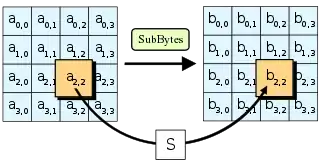Bricklayer function
In cryptography, the bricklayer function is a part of a round function that can be decomposed into identical independent Boolean operations on the partitioned pieces of its input data,[2] so called bundles.[3] The term was introduced by Daemen and Rijmen in 2001.[1]

The SubBytes transformation of the Advanced Encryption Standard is a notable[1] example of a bricklayer function: each 8-bit bundle of the 128-bit state is undergoing the same S-box transformation independently
If the underlying function transforming the bundle is nonlinear, it is traditionally called an S-box. If the function is linear, Daemen and Rijmen use for it the term D-box (after diffusion).[2]
References
- Weinmann 2009, p. 36.
- Daemen & Rijmen 2013, p. 22.
- Daemen & Rijmen 2013, p. 20.
Sources
- Daemen, Joan; Rijmen, Vincent (9 March 2013). "Bricklayer Functions". The Design of Rijndael: AES - The Advanced Encryption Standard (PDF). Springer Science & Business Media. pp. 22–23. ISBN 978-3-662-04722-4. OCLC 1259405449.
- Weinmann, Ralf-Philipp (2009). Algebraic Methods in Block Cipher Cryptanalysis (PDF) (PhD). Technischen Universität Darmstadt.
This article is issued from Wikipedia. The text is licensed under Creative Commons - Attribution - Sharealike. Additional terms may apply for the media files.